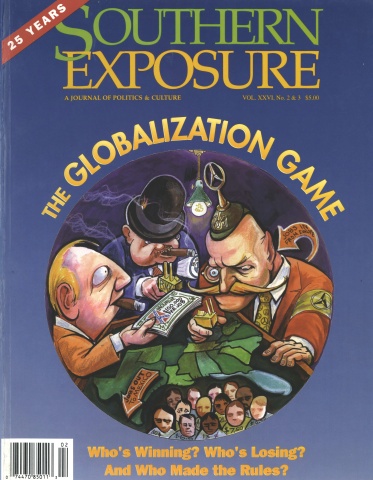Workers of the World, Network!

This article originally appeared in Southern Exposure Vol. 26 No. 2/3, "The Globalization Game." Find more from that issue here.
The South has become a location of choice for corporations seeking natural resources, low wages, few and often weak unions, tax breaks, and lax regulations. And as companies move from as far away as Europe to take advantage of the workers and residents of the southern U.S., workers are mobilizing and joining forces to fight back.
Heiner Kohnen heads the German office of the Transnational Information Exchange (TIE), an international network of labor-rights groups formed in 1977 to promote cross-border solidarity. He sees the state of the U.S. South as crucial to workers across the globe. “The South plays a role in North America as a cheap, union-free labor resource,” Kohnen says. “It is used as a competitor and hammer for concessions to other regions and workers.”
He adds that the recent merger of auto giants Daimler-Benz and Chrysler could lead to “future runaway shops [from Europe to the South], specifically in the parts and supplier sector.”
Well aware of the South’s role in the downward spiral of wages and workers’ rights, activists in the 1990s have taken the cause of organizing the South to the global stage. While unions here are seeking to organize workers in the South, other labor activists are creating linkages between southern U.S. workers and their counterparts in other countries.
In 1995, Kohnen and a group of German workers toured the South. “The interest of the workers was to understand the consequences [of plants relocating to the South] and to debate the possibilities of fightback,” he says. “The tour was a huge help for the struggle in Germany.”
The trip also gave German workers a chance to see first-hand new plans for corporate restructuring, including “lean production,” concessions bargaining, and “worker/management partnership” approaches.
In other cases, workers are banding together across borders for joint campaigns. This past February, union activists from Holland came to the aid of workers at a DSM Polymer plant in Wytheville, Virginia, who were seeking to organize with the Oil Chemical and Atomic Workers (OCAW) union. DSM is a Netherlands-based company with 19,000 workers in the United States, Canada, and Europe.
Workers say the assistance from Dutch union leaders is what tipped the scales in the union’s victory in Virginia. The Dutch activists talked to workers, and pressured officials at the DSM Polymer plant and at DSM headquarters in Holland to recognize OCAW. In addition, members of the Dutch union protested at DSM’s headquarters in Holland to raise awareness of the Virginia workers’ fight for a union.
The Virginia workers’ campaign became a cause in Holland because of the glaring differences between the way Dutch workers and American workers are treated by the same employers. In Holland, DSM workers are members of the powerful Industriebond union. DSM workers there have a 36.5-hour workweek and four weeks of vacation. They are also trained and transferred to other plants when DSM reorganizes or reduces operations. This is in addition to the country’s strong support of government health care and other social services.
“We were lied to by management [during the organizing drive], which does not happen in the Netherlands,” Henk Walravens, an Industriebond representative, told an OCAW reporter. “The lies made it even more important that we help OCAW and the workers in Wytheville to win.”
OCAW President Robert Wages said that the Dutch unionists’ involvement in the victory “signals a growing awareness of the necessity for unions to work together in the global economy.”
The unions and workers involved in these exchanges agree that workers in different countries can learn from each other. Organizations like TIE hope that organizing solidarity for worker struggles around the world — through a grassroots approach — will bring the understanding needed to organize.
What opened the debate for us here [in Germany],” says Kohnen, “was to understand the strategic role of a region that is marginalized, union free, and racist.”
Tags
Leah Samuel
Leah Samuel is a writer for Labor Notes. (1998)